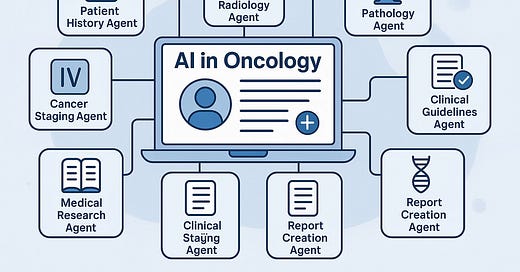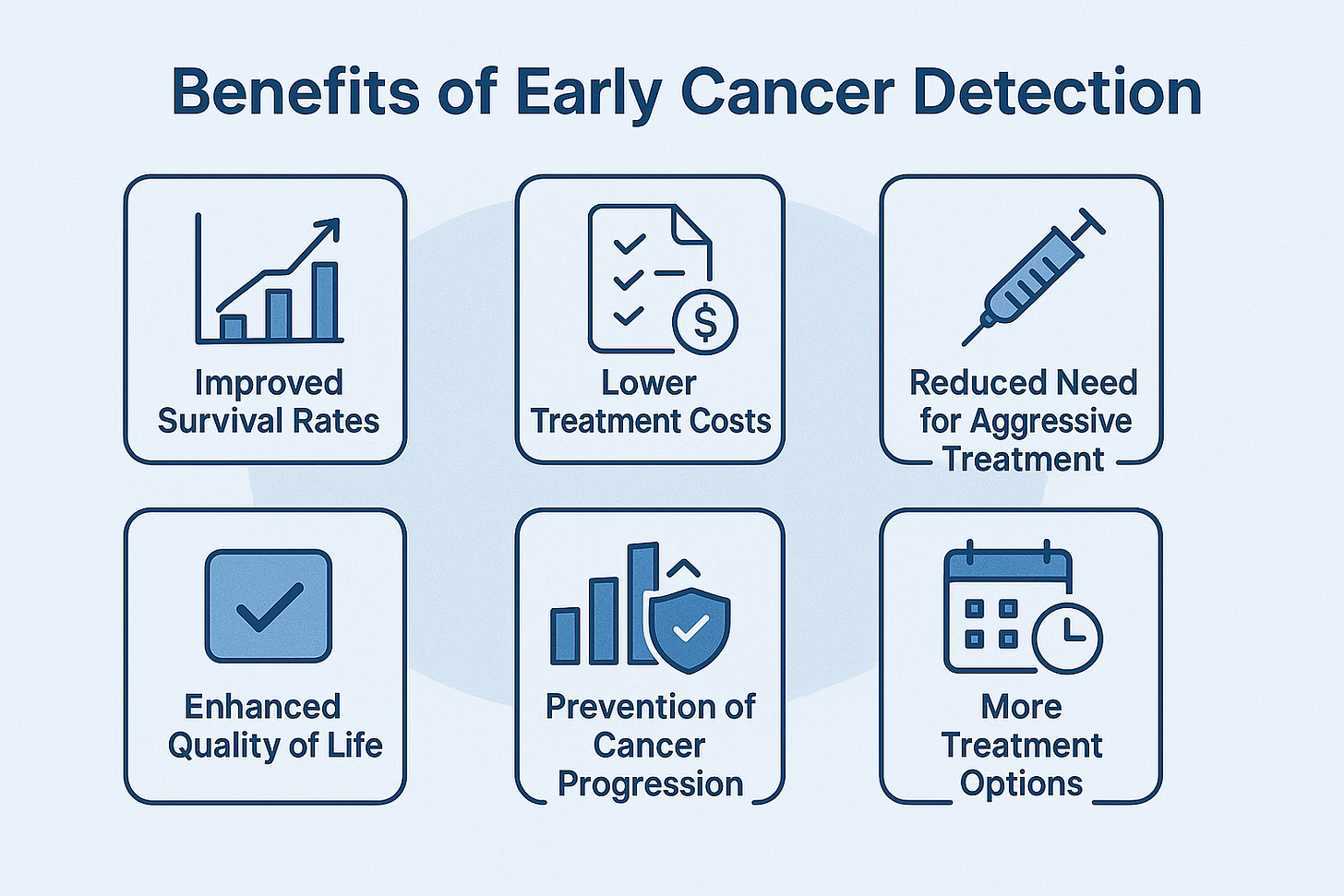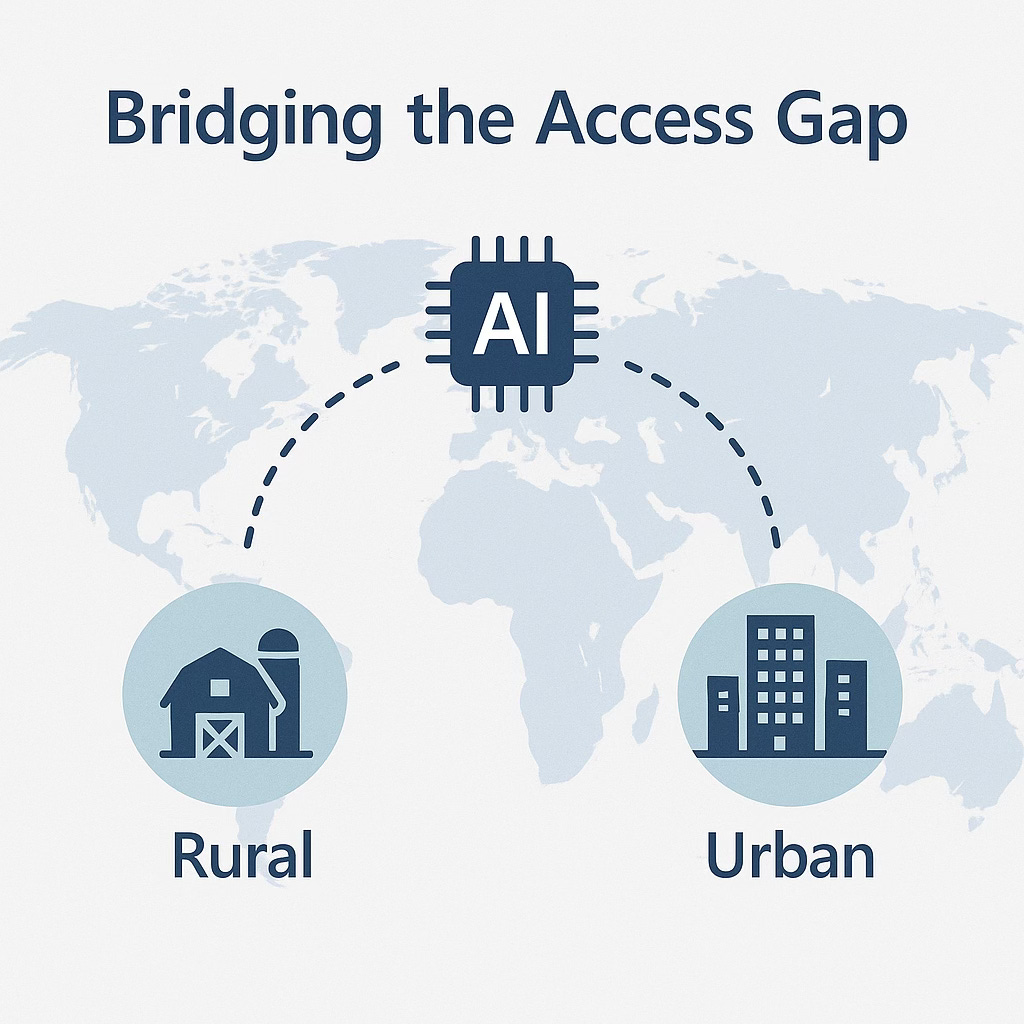Microsoft's Healthcare AI Orchestrator: A Game-Changer for Cancer Treatment Decision-Making
Expediting insight and improving outcomes
Cancer care is at the cusp of an AI revolution. Microsoft's newly announced healthcare agent orchestrator represents a significant advancement in how artificial intelligence could transform cancer treatment planning, patient data management, and clinical decision support systems.
As someone who has navigated breast cancer personally and supported family members through their cancer journeys over four decades, I see enormous potential in this technology to address critical gaps in oncology care.
How Microsoft's AI Agents Could Transform Cancer Care Coordination
When my sister Tracey faced Stanford's tumor board in 2003 for her triple-negative breast cancer, a team of specialists spent hours preparing for a single meeting to determine her treatment plan. Twenty years later, when I received my own cancer diagnosis, this labor-intensive, expert-driven process remained largely unchanged.
Microsoft's healthcare agent orchestrator creates a virtual tumor board by coordinating multiple AI agents, each specializing in different aspects of cancer care:
Patient History Agent: Organizes fragmented medical data chronologically
Radiology Agent: Analyzes diagnostic imaging
Pathology Agent: Interprets tissue samples and biomarkers
Cancer Staging Agent: Applies AJCC guidelines for accurate cancer staging
Clinical Guidelines Agent: References NCCN treatment recommendations
Clinical Trials Agent: Matches patient profiles to appropriate clinical trials
Medical Research Agent: Extracts relevant evidence from scientific literature
Report Creation Agent: Generates comprehensive treatment summaries
According to Microsoft’s Chief Scientific Officer, Health and Life Sciences, Matthew Lungren, MD, MPH, this AI-powered system could dramatically reduce the preparation time for tumor board reviews from hours to minutes, potentially expanding personalized cancer care beyond the mere 1% of patients who currently benefit from multidisciplinary tumor boards.
Three Key Cancer Care Innovations in Microsoft's AI System
1. Automated Patient Timeline Construction
One of the most promising features is the patient history agent, which uses Universal Medical Abstraction to organize patient data chronologically. This technology transforms what typically takes clinical specialists over three hours into a task completed in minutes.
In "Crushing the Cancer Curveball," I emphasize how fragmented medical records create significant barriers to optimal care. When Alysia, whose journey I featured in my book, sought treatment for her lobular breast cancer, her medical history was scattered across multiple providers. Consolidating this information manually created significant overhead and stress for her, as it required her to coordinate and inform critical treatment decisions.
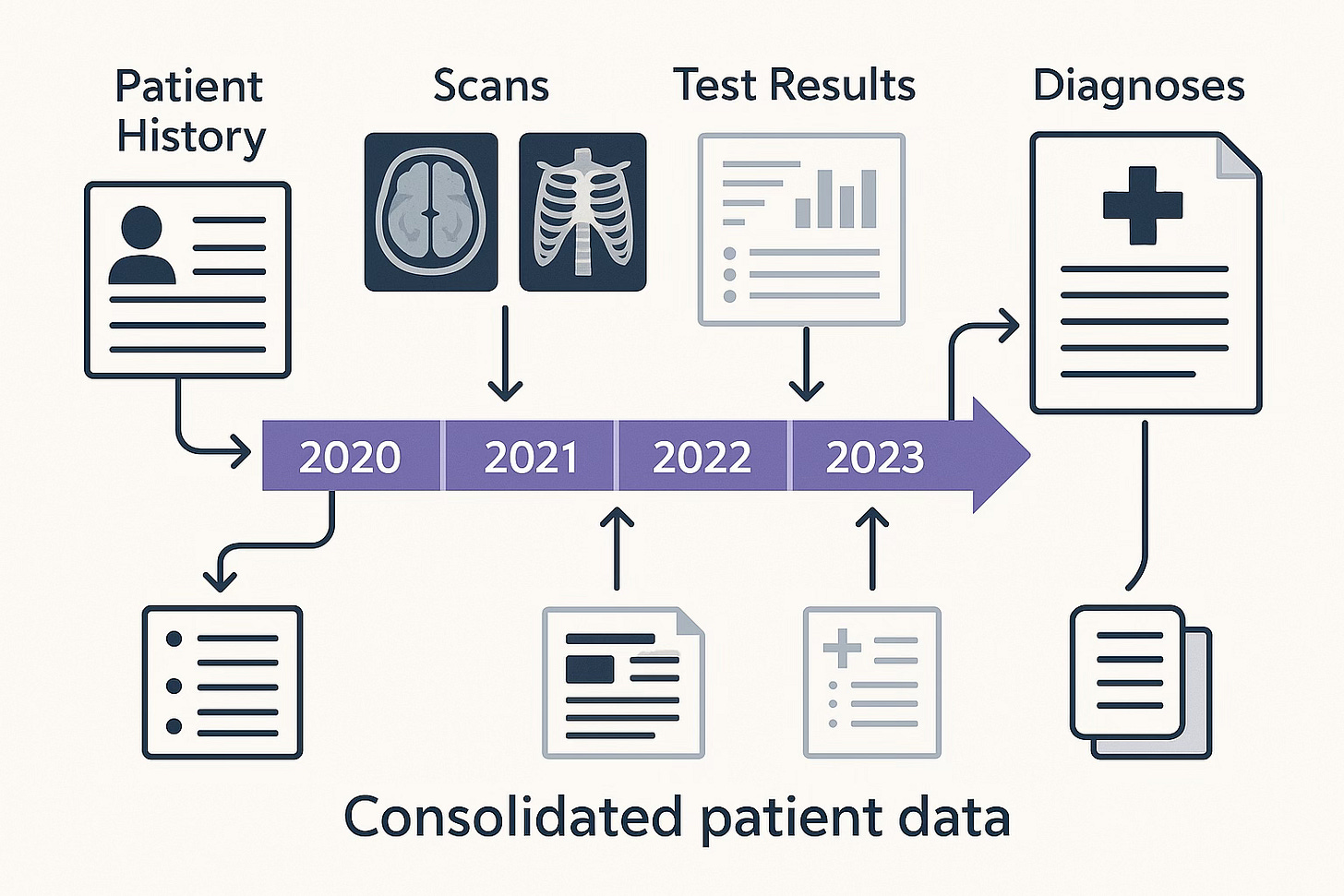
Microsoft's technology could eliminate these dangerous delays by instantly creating comprehensive patient timelines, giving oncologists a complete picture before the first consultation.
2. Enhanced Clinical Trial Matching
The clinical trials agent may represent one of the most significant advances for cancer patients seeking cutting-edge treatments. Microsoft claims that this technology can more than double the accuracy of matching patients to the most suitable trials compared to current methods.
Clinical trial matching is notoriously inefficient. When exploring experimental treatment options during my cancer journey, I encountered numerous dead ends—trials that weren't accepting new patients, had location restrictions, or included exclusion criteria not clear from initial descriptions.
An AI system that efficiently identifies truly viable clinical trial options could dramatically expand access to innovative treatments, particularly for patients with rare or advanced cancers.
3. Evidence-Based Research Integration
The medical research agent delivers "actionable, evidence-based guidance grounded on graph-based knowledge from trusted medical journals." This technology addresses a critical gap in cancer care: the challenge of keeping pace with rapidly evolving medical literature.
Cancer treatment protocols evolve constantly. When my oncologist recommended carboplatin-Taxol plus Keytruda for my triple-negative breast cancer, this protocol represented relatively recent advances in immunotherapy. Patients and physicians alike struggle to stay current with the latest research relevant to specific cancer subtypes.
Microsoft's system promises to synthesize this ever-expanding body of knowledge, potentially democratizing access to cutting-edge treatment approaches regardless of where patients receive care.
Future Opportunities: Financial Navigation in Cancer Care
While Microsoft's announcement focuses on clinical decision support, there's significant potential to expand this technology to address the financial dimensions of cancer care. Understanding treatment costs and insurance coverage remains an essential challenge for patients.
In "Crushing the Cancer Curveball," I documented how financial toxicity often compounds the physical and emotional toll of cancer. A future enhancement to Microsoft's system could involve an agent that:
Estimates treatment costs based on historical insurance claims data
Identifies commonly covered vs. frequently denied treatment approaches
Connects patients with financial assistance programs
Compares the cost-effectiveness of similar treatment protocols
Though implementing such capabilities would require navigating complex healthcare financing data, it represents a significant opportunity to enhance patient-centered cancer care further.
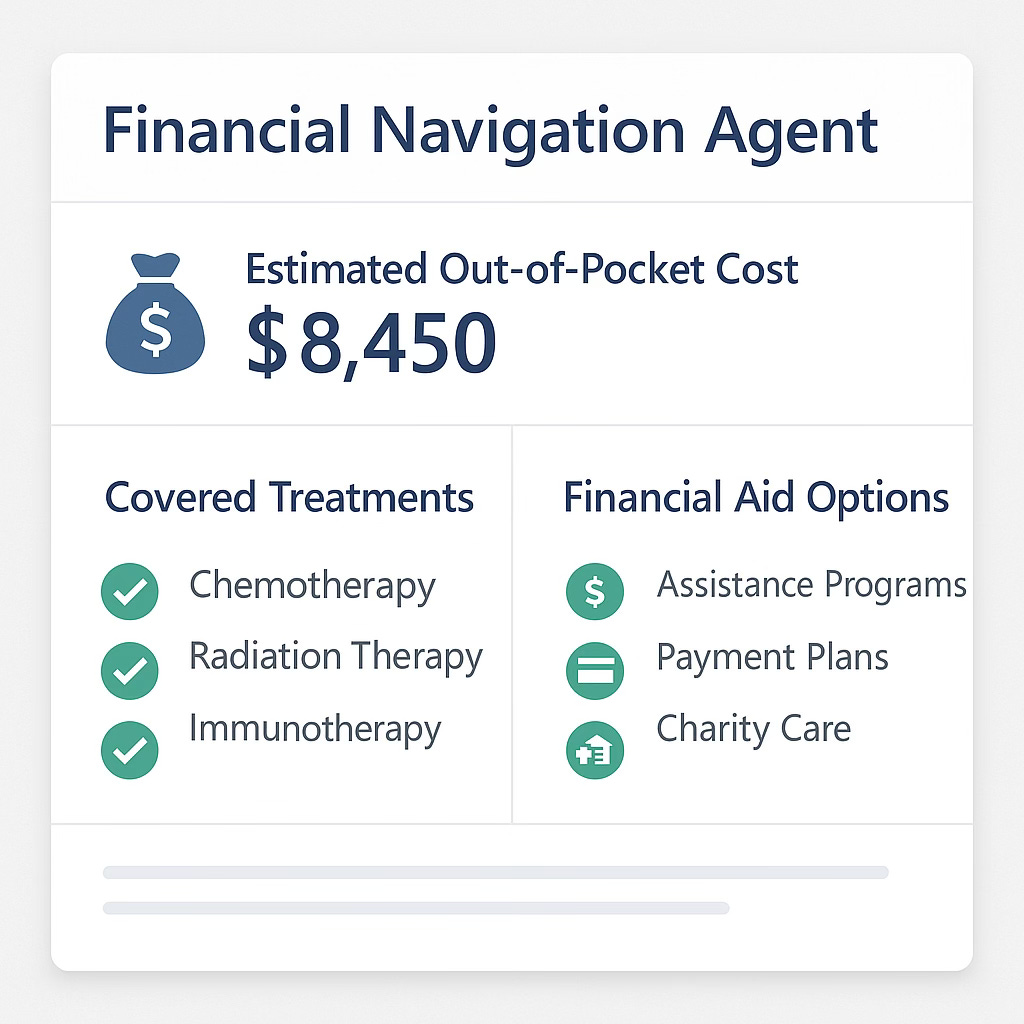
Key Questions for Patients to Ask About AI in Oncology Care
If you or a loved one faces a cancer diagnosis, consider asking your healthcare team these questions about AI-assisted treatment planning:
Does your cancer center utilize AI tools for treatment planning or clinical decision support? Several leading institutions are already implementing AI systems with Microsoft and potentially other technology leaders.
How does your healthcare system use AI to identify appropriate clinical trials? Understanding whether your care team leverages AI for trial matching could expand your treatment options.
What safeguards protect patient data privacy when AI systems analyze medical records? Please ensure you understand how your information is secured and shared.
Can AI tools help personalize treatment recommendations based on my specific cancer subtype, genomic profile, and medical history? AI excels at identifying patterns across complex datasets that might inform your treatment.
Would my case benefit from tumor board review, and does your institution use AI to enhance that process? Not all cases require tumor board evaluation, but understanding how AI might support this process is valuable. When I asked if my case was going before the tumor board, Dr. Chien chuckled and said No, my case was not interesting or complex enough!
Human Expertise and AI Augmentation in Cancer Care
Despite the promising technological advances, the human element remains irreplaceable in cancer care. When facing my own diagnosis, the compassion of my oncologist, Dr. Chien, and the intuitive adjustments made by my reconstructing surgeon, Dr. Piper, were as vital to my healing as their technical expertise.
Microsoft appears to recognize this reality, positioning their system as augmenting rather than replacing clinical specialists. The most effective approach to cancer care will likely combine AI's analytical capabilities with the empathy, intuition, and judgment that only human providers can offer.
Democratizing Access to Expert-Level Cancer Care
Perhaps the most transformative potential of Microsoft's healthcare agent orchestrator is its ability to democratize access to high-quality cancer care. Currently, treatment outcomes vary dramatically based on geographic location and hospital resources.
If this AI system can bring tumor board-level analysis to community hospitals and rural clinics, it could help address persistent healthcare disparities in cancer outcomes. For patients unable to travel to major cancer centers, this technology could provide local providers with decision support comparable to what's available at leading institutions.
The path to crushing cancer's curveball increasingly includes artificial intelligence as a powerful teammate. While technology alone cannot cure cancer, tools like Microsoft's healthcare agent orchestrator may soon ensure that every patient, regardless of location or resources, has access to the best possible treatment plan for their unique situation.
What role do you think AI should play in cancer care? I'd love to hear your thoughts on how we can harness these technological advances while maintaining the human connection that remains essential to healing.

